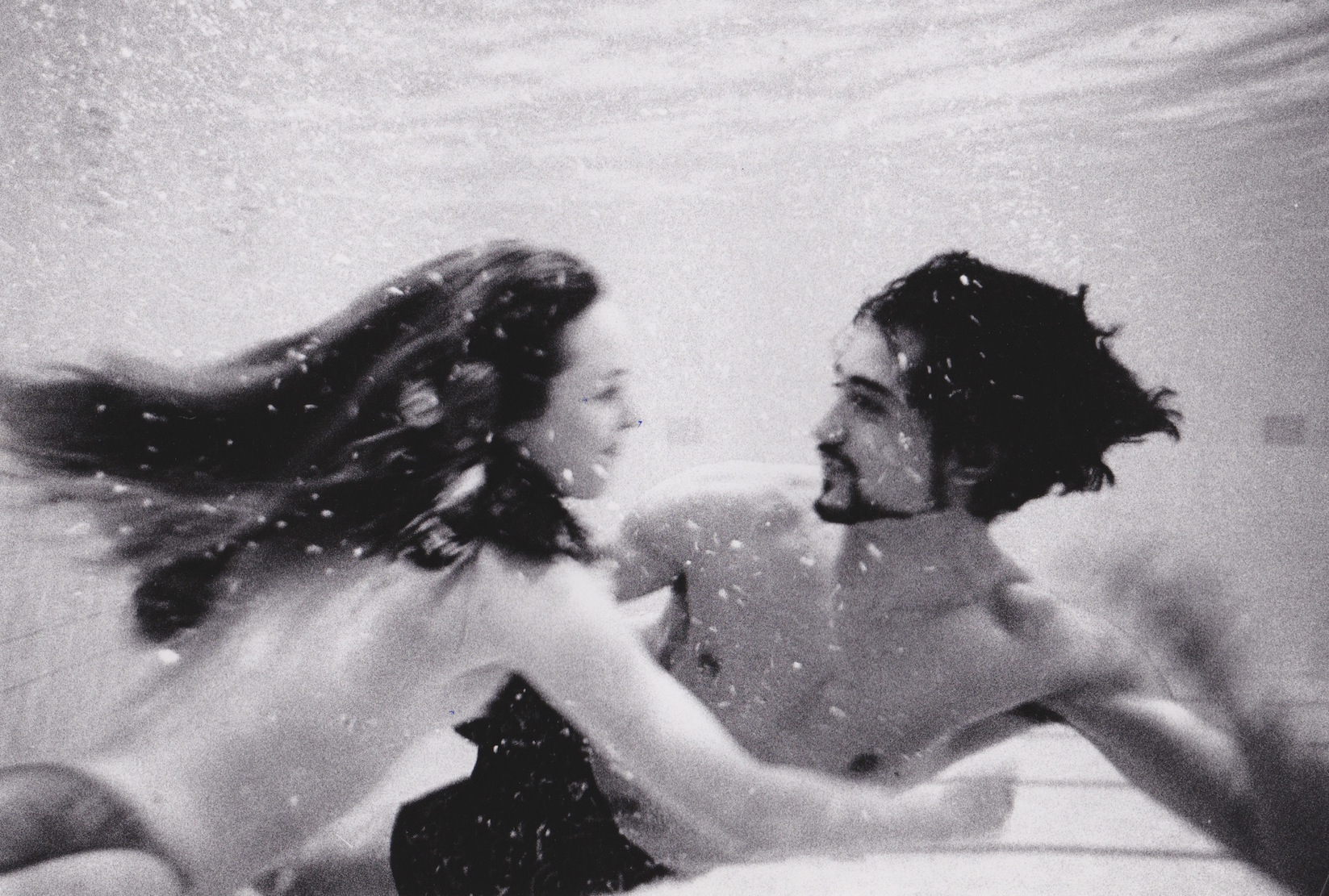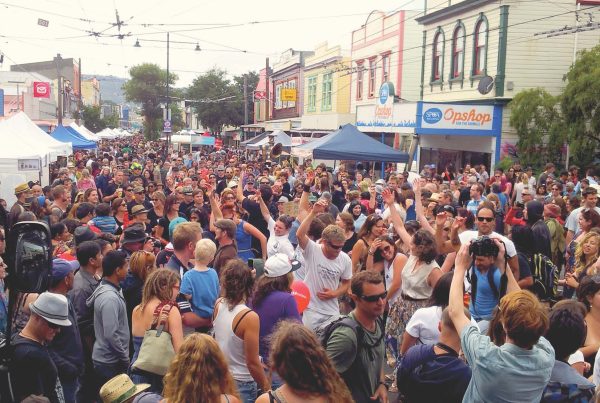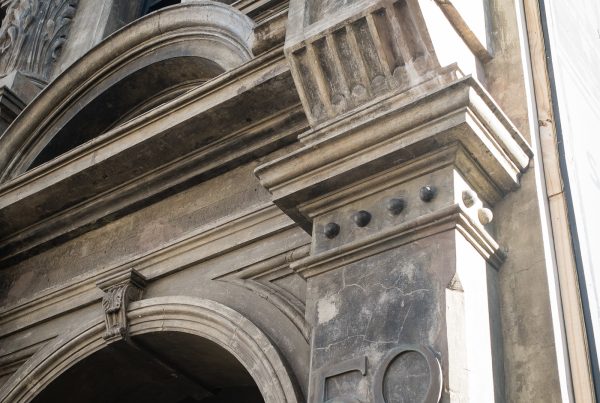
BATS and the Buffalo Hall in 1989
‘The black box’. A small, dark room tucked away at the back of a building that housed a strange group known as the Royal Antediluvian Order of Buffaloes. Its walls were chalky black and always smelt like they’d been freshly painted but were still cracked and peeling. The operator’s booth was so small it boarded on being a war crime. The seats were secured by the most tenuous of measures and sitting down too hard would cause the entire row to rock.
Backstage was no better. The carpet was threadbare, bulbs were on their last legs, props from old shows cluttered the entrances and exits. On any given production you were likely to encounter a giant penis or the severed rear end of a horse lurking backstage.
It was madness. Wonderful, unadulterated madness. And it shaped the lives and careers of so many New Zealand performers, writers, directors and producers. Yes, it was a black box where no light could find purchase, but BATS was an incubator of talent.
Anthony McCarten, one of the co-authors of the Kiwi play Ladies’ Night, was one of these bods. Nowadays he’s playing on a much bigger stage: his screenplay about the life of Stephen Hawking, The Theory of Everything, is soon to hit the big screen.
“Yes, I remember it well; that somewhat haunted little theatre beneath a spooky freemasons’ tabernacle where a cobbled-together management of volunteers (bar one salaried manager) would, for a slice of the box office, open their doors to your theatrical ideas, no matter how whacky or whimsical. It was Wellington’s Off-Off-Off Broadway and, given that Wellington is very Off-Off-Off-Off New York, then we need to employ a great many Offs here to accurately describe its place in the world scene. But it was available. You could not take that away from it. It had a stage, seats, lights, a fire exit and a bar — and what more really does any thespian require?”

john Leigh, Cameron Rhodes and David Geary in Twelfth Night (1989)
BATS was raw, dirty and often strangely accessible in its inaccessibility. Cal Wilson, Kiwi comedian extraordinaire who has gone on to star on such shows as QI with Stephen Fry, has fond memories of BATS.
“I remember a Toby Manhire play in which Duncan Sarkies recorded himself having half a conversation,” recounts Wilson, “then played the tape back onto a TV onstage, and had the other half of the conversation with himself. I can’t remember how it ended, only that his recorded self humiliated his live self, and that it blew my mind.”
That same Duncan Sarkies has gone on to become a respected and lauded writer of stage, screen and literature — just one of the many talented folks who got a kickstart onstage at BATS. The theatre also staged many of his first plays. Toa Fraser’s play No. 2 (performed by the sensational Madeline Sami) went on to become the film that started his impressive career as a film director.
Steven Sinclair, filmmaker and credited screenwriter on some lesser-known arthouse films called Lord of the Rings, also has fond memories.
“My first production at BATS Theatre was in 1989. The Sex Fiend, co-written with Danny Mulheron, who also starred, and directed by Duncan Smith, is a seven-door farce and satire on political posturing. The show sold out and transferred to the Opera House for three nights. Listener reviewer Denis Welch wrote he almost fell out of his seat he laughed so much, and called it the funniest New Zealand comedy he had ever seen. Ah, such heady times!”
In fact, when you start to look at some of the names that began the early years of their career on this stage, it becomes frighteningly extensive. Kerry Fox and Robyn Malcolm started here before taking their talent to the world.
The Humourbeasts, featuring Taika Waititi and Jemaine Clement, stalked this stage — an insane show brimming with inventive ideas and humour. You stumbled out onto the street afterwards with the feeling you had just been assaulted by a genius armed with a brick.

Kerry Fox and Emma Robinson in Jism (1989)
I remember sitting at the BATS bar with five others when two guys came in with guitars, sat down at the barstools and started playing. It was almost like sitting in someone’s lounge while they strummed away at a party. I think they were called Flight of the Conchords from memory. I wonder if they’re still around? They were pretty good.
With the highs also came the lows. Once at BATS I was one of two people in the audience. The other audience member left and then the six people on stage started arguing whether they should continue performing to one person. The ensuing shouting match was better than anything from their script. This was the pure joy of BATS: it was a place that served up productions without discrimination. Triumph and tragedy. With most theatres a flop could mean certain death, but at BATS it didn’t matter — the audience still returned, hungry for more.
Pip Hall, daughter of playwright Roger Hall and an outstanding playwright in her own right, sums BATS up: “I love the vibe, the inclusive nature of the place. That anything and everything was possible. So many different shows and practitioners. It was so vibrant and alive. It seemed to hum 24 hours a day. A place for risk-taking — for success and failure and the importance of both. Hanging at the bar, talking theatre and life and shit to all hours. It’s more than a theatre, it’s a community.”
BATS is more than just a theatre — it’s a culture. It all came about, not by design, but by a strange butterfly effect that began, as these things so often do, with young, bright-eyed idealists. Rather than being named after a nocturnal creature that haunts the night (which seems so fitting), BATS started its life as B.A.T.S., which stands for Bane and Austin Touring Society — named for Rodney Bane and David Austin, the godfathers of BATS if you will. So how did it all start? Was it around a smoky table littered with glasses of wine and playbills?
“It probably was,” chuckles Bane. “Both of us smoked in those days, and drank wine. We decided to form our own company to produce plays that we wanted to do and to be in, and not be restricted by committees, or the narrow casting choices that prevailed, especially around a young brown chap from the UK like myself!”
In 1979, the first year of BATS at Kent Terrace, they staged 11 plays, sometimes having two plays in rehearsal at the same time as one on the boards. In those days, the ‘T’ in BATS stood for touring.
“David and I did tour those first shows — up as far as Otaki!” Bane explains. “We even earned a ban notice from the local vicar who didn’t appreciate the content — one play was about an alcoholic, the other about a cannibalistic gay! The T for Touring eventually got changed — not so you’d notice — to T for Theatre.”
In 1989, the reins of BATS would eventually be taken over by another couple of young men frustrated at the theatre establishment. Simon Bennett and Simon Elson had collaborated on an acclaimed Summer Shakespeare production of King Lear in 1988 and were determined to find a venue where young theatre-makers such as themselves could get their professional start. They proposed to take over the lease of the venue and run it as a theatre by — and for — young people, a manifesto the theatre still maintains.
Bennett has gone on to be an established — and bloody good — director of film, TV and cinema. “I knew BATS theatre as a venue for many years,” he explains. “I was actually in a play when I was ten years old when it was the venue for Unity Theatre. My father was directing and I walked in and played the violin on stage in the first scene. Then I used to sleep for the rest of the evening in the props room under the stairs.”
But what spurred the two Simons to take on such a burden?
“It came from a shared idea about what theatre ought to be and an inability to get the kind of work we wanted to see happening,” according to Bennett. “Simon Elson and I spent a lot of time talking and drinking and planning and brainstorming and doing the whole ‘what if’ kind of thing. Then I got the opportunity between my first and second year at drama school to direct the Summer Shakespeare at Victoria University. Simon Elson was lighting designer/sound designer operator. We had wrecked cars in the quad with microphones hidden in them so you could bash the cars up and the sound would reverberate Pink Floyd-like around the quadraphonic sound system. Simon made chandeliers out of smashed bottles hanging from bicycle wheels. It was a full-on technical show and it was heaps of fun. And we decided we wanted to do more of this kind of thing.”
David Geary, the playwright responsible for works as diverse as Gothic But Staunch and Pack of Girls, sums up BATS in his own unique, wonderful, poetic style…
“BATS — You were my crazy 80’s Gothy girlfriend.
“Basic black, Doc Martens, chain-smoking Drum rollies, and chugging down Macs Ale till you spewed out the Fire Exit to the applause of the firemen next door. Scoffing down fish ’n’ chips and L&P in a pre-beefcake calendar world. You became my drama school. Literally, after the NZ Drama School in Vivian Street went up in smoke when their massage parlour neighbours had a ‘suspicious’ fire.”
Sometimes stars can burn a little too bright and BATS future almost went up in flames, literally, in 1990. A fire left the walls charred and thousands of dollars worth of props and equipment went up in smoke. A variety concert at the St James Theatre helped raise funds to give BATS back its wings. True to form, the concert rejoiced in the subversive name Got a Light.
Wellington businesses came to the rescue too, donating labour and materials for the rebuilding project. Even ‘rival’ theatres Circa and the Depot came to the party and held benefit shows at Downstage Theatre.
It’s also prudent to acknowledge the involvement of David Suisted. He’s an accountant, not a showy artist like the rest of these characters, but without his intelligence, forward-thinking and street smarts, BATS theatre would not be around today. The same is true of the many, many people who have gone unmentioned in this piece, but to name them all would take up the entire magazine.
BATS is an enduring force. This was proven, once again, when faced with closure as the ageing Buffaloes faced the thinning of their herd and decided to put the building up for sale in 2011. Property developers began circling like money-hungry sharks keen to, no doubt, level the building and put up another Gold Coast-style monstrosity.
To the rescue came Victoria Spackman, current CEO of Gibson Group and chair of the BATS board, who, as irony would have it, once appeared at age 14 as Goldilocks in one of Bane and Austin’s pantomime productions. She, with the backing of the BATS board, contacted Sir Peter Jackson and asked if he would help. He looked at the deal and, like Goldilocks, decided it was just right. Many of Jackson and his partner Fran Walsh’s friends and contemporaries started at BATS and I’m sure, back in the day, he and Walsh have enjoyed more than a few evenings in the audience at the black box.
The future of BATS is secure. Thank you Peter and Fran. Thank you Rodney and David. Thank you Simon and Simon. BATS owes its life and continued existence to the dreamers and the outsiders.
I think it’s only fitting that we leave the last words to the people who helped shape BATS and whom, in return, it shaped.
“My enduring hope is that BATS will stay true to its roots and mission,” concludes Simon Bennett. “To be the unpretentious little risk-taking theatre that focuses on new work, and stays accessible to audiences and practitioners alike. As long as it manages to do this, I fully expect BATS to still be going strong in another 25 years!”
“It’s a huge part of the Wellington theatre scene,” says Rodney Bane. “Something David and I are proud of. We still seem to have that kind of ‘wow’ associated with our names as the founders of such an iconic ‘brand’.”
“My deepest gratitude lies in the many happy nights I simply came to the place and for a pittance watched other people’s wonderful work,” reminisces Anthony McCarten. “Cabaret, satire, farce, fashion, laughter and tears flooded that little square stage, and while not the vasty fields of France that Shakespeare summoned, it was ours, all ours, and was all the better for it.”
In a wonderful piece of cyclic storytelling, one of the old guard, Stephen Sinclair, is actually returning to the fold. “I’m currently talking to BATS at the moment about putting on a season of my latest play,” he explains. “So, this is a relationship spanning 25 years. So far. BATS is one of those resources that empowers the artist. If the established theatres don’t want to know you, screw ’em! With the help of BATS you can take your destiny in your own hands. Viva la BATS!”
The final words, however, go to David Geary. His response to my questions was pure poetry, showing off in a way that only a writer can…
“I loved you, BATS baby. You were my sanctuary, my school, a petri dish, a place to find my tribe, a home. I hope you find more lovers, and remain a muse to us all.”












